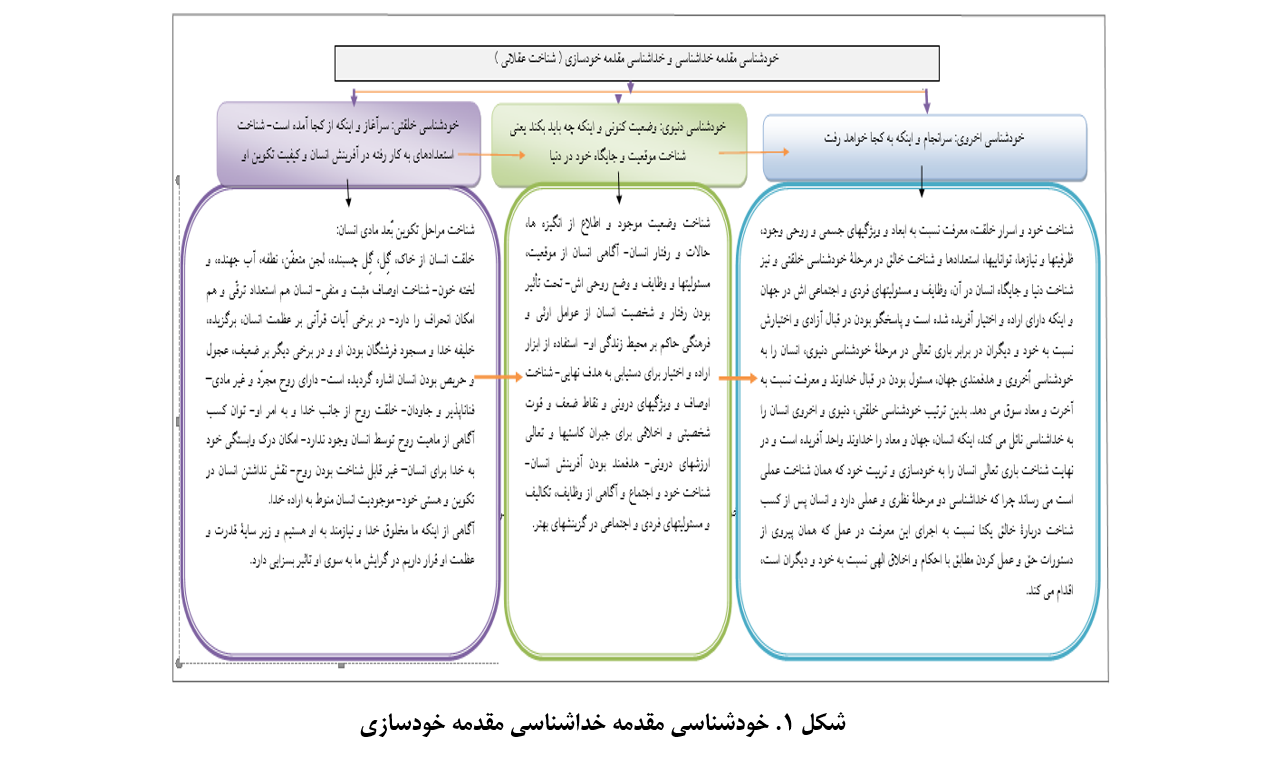تحلیل تربیتی خودشناسی توحیدی کودک، نوجوان و جوان در برنامه درسی ملی: ارائه مدل مفهومی انسان شناختی
کلمات کلیدی:
تربیت, کودک, نوجوان و جوان, برنامه درسی ملی, مدل مفهومی, انسان شناختی, قرآن کریم, خودشناسی توحیدیچکیده
هدف از انجام پژوهش حاضر، بررسی رابطـه مبـانی و اصـول برنامـه درسی ملی جمهوری اسلامی ایران بـا مفهوم خودشناسی توحیدی دانش آموزان بـه منظور پیشنهاد برنامه درسی مطلـوب در راستای زمینه سازی برای ارتباط علمی، عقلانی، ایمانی، عملی و اخلاقی دانش آموزان با خود و تحقق خودشناسی، خداشناسی، خودسازی، حیات طیبه و قرب الهیست. بـر ایـن اسـاس، ابتـدا بـا استفاده از روش تحلیل محتوای اسنادی، ضمن تعیین مفهوم خودشناسی توحیدی و برنامه درسی ملی، میزان رابطه و همپوشی اصول و مبـانی برنامه درسی ملی با مفهوم خودشناسی مبتنی بر قرآن کریم و احادیث تشـریح شـده و نظراتی برای برنامه درسی مطلوب از بُعد خودشناسی توحیدی دانش آموزان، ارائه شده است. با توجه به اینکه در سند برنامه درسی ملی ذکر شده:« برنامه درسی ملی به عنوان یکی از زیرنظامهای اصلی سند تحول بنیادین و به منزله نقشه جامع یادگیری، زمینه ایجاد تحول همه جانبه، گسترده و عمیق در مفاهیم و محتوای آموزشی را فراهم میآورد.»، بنابراین بهتر است نتیجتاً فرصتی را برای شکوفایی اخلاقی با طی کردن پلههای عمل با رنگ و بوی ایمان قلبی که الهام گرفته است از اندیشه ورزی عالمانه نسبت به خود و غرق شدن در خالق خود، پیش روی کودکان، نوجوانان و جوانان پاک و بی ریای مان بگسترانیم و فراگیری و مهارت آموزی معیارهای اصیل خودشناسی توحیدی را در نهاد آنها بارور کنیم تا در زندگی واقعی آنها به ظهور و بروز برسد.
دانلودها
مراجع
Saeidi M, Shamsiri B, Mazidi M. Examining ethnic identity in the national curriculum document of Iran (with an emphasis on the views of teachers and specialists). Cultural University, Quarterly Journal of Educational Research. 2023;8(32).
Mehrgan S, Farhadi Rad H. Evaluation of the process of developing the national curriculum transformation document of the Islamic Republic of Iran. Interdisciplinary Studies in Education. 2023;1:7-30.
Irman I, Wasliman I, Warta W, Naufal SMR. Management of the Implementation of the National Curriculum Based on Islamic Boarding School Education to Improve the Quality of Madrasah Aliyah (Descriptive Analytical Study at MA Al-Masthuriyah, MA Sunanul Huda, MA Al-Amin, Sukabumi Regency). JHSS (Journal of Humanities and Social Studies). 2023;7(1):022-9. doi: 10.33751/jhss.v7i1.7234.
Mousapour N, Sadr A, Rost M, editors. National curriculum and changes in curricula. Proceedings of the National Conference on Changes in Educational Curricula, 13th session; 2013.
Abedi Movahed M, Fazlollahi Qomshi F, Sharafi Rad SG. Primary education and values in a qualitative-comparative approach with the national curriculum document of the Islamic Republic of Iran. Knowledge. 2023;31(4):295.
Ahmadi A. Examination of key levels and stages in the national curriculum of the Islamic Republic from the perspective of psychological findings. Quarterly Journal of Curriculum Studies in Iran. 2010;5(18):120-46.
Rahmanpour M, Nasr Isfahani AR, Seyyed A, Yaqoubi S, editors. Analytical examination of the theoretical basis of the national curriculum of the Islamic Republic of Iran in line with the realization of resistant economy themes. Curriculum in Iran: The Gap Between Theory and Practice; 2015 Abstracts of the 13th Conference of the Curriculum Studies Association in Iran.
Vaisi G, Fathi Vajargha K. A new look at the curriculum based on Islamic anthropology. Strategies of Education Journal. 2008;1(2).
Yadollahi Far MJ, Sahabat Anvar S, Heydari N. Content analysis of the 11th-grade psychology textbook based on the five elements of the national curriculum (Reasoning, Faith, Science, Action, Ethics). Scientific Research Journal on Issues of Islamic Education. 2023;30(57).
Akhsh S, Hosseini F. Conceptualization of salvation in the verses of the Quran and its implications for a good life in the national curriculum document. Scientific Journal of Islamic Human Sciences. 2018;4(13):79-88.
Bahadori N, Ahmadi M, Asadpourian M, editors. Standards of the national curriculum of Iran in mathematics textbooks. Proceedings of the 17th Mathematics Education Conference; 2019 Tabriz, August 26-28, 2019.
Aghazadeh M, Saneh A. Physical education in the national curriculum. Growth of Physical Education Education. 2013;3:14-9.
Mahdizadeh I, Hamedi Nasab S, editors. Content analysis of the new and old editions of the third-grade social studies textbooks based on the values of the national curriculum document. Proceedings of the National Conference on Changes in Educational Curricula, 12th session; 2013.
Khoramian H, Nateqi F, Sifi M. The role of critical thinking in Islamic education based on the national curriculum document. Research in Islamic Education Issues. 2016;25(34):133-51.
Sadeghi A. Examining the national curriculum document of the Islamic Republic of Iran based on a multicultural education approach. Quarterly Journal of Curriculum Studies in Iran. 2010;5(18):190-215.

دانلود
چاپ شده
ارسال
بازنگری
پذیرش
شماره
نوع مقاله
مجوز
حق نشر 2025 نشریه پژوهش و نوآوری در تربیت و توسعه

این پروژه تحت مجوز بین المللی Creative Commons Attribution-NonCommercial 4.0 می باشد.










